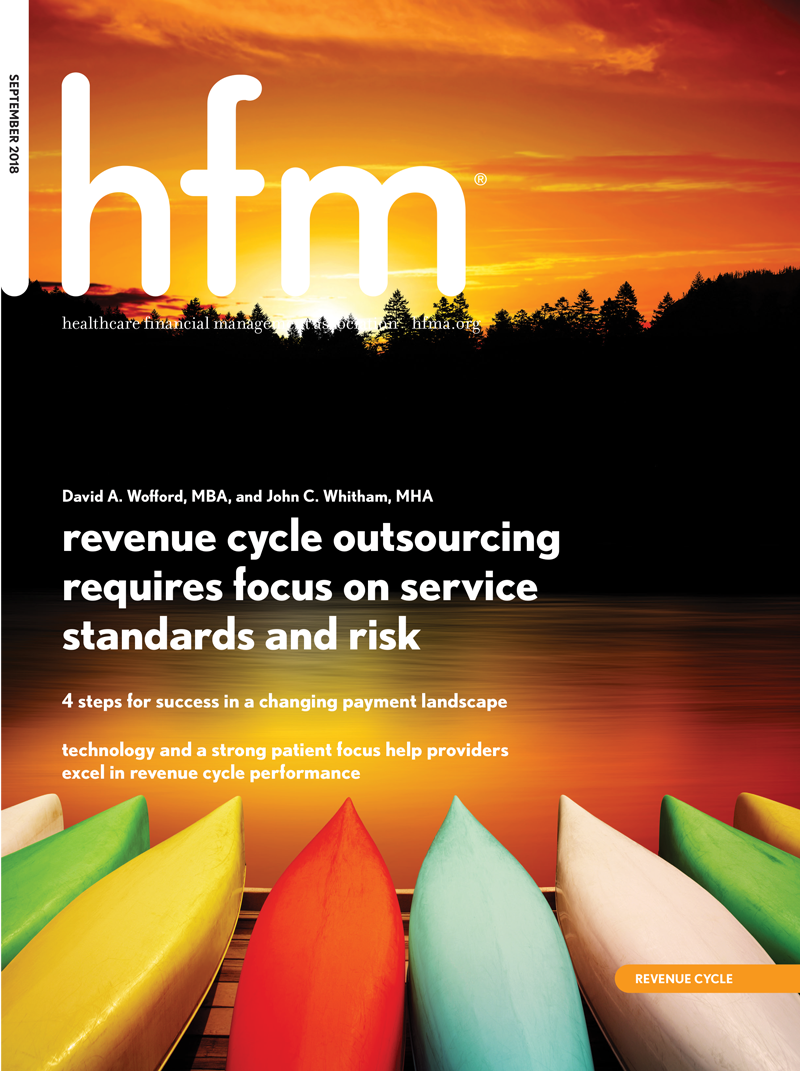
Cover Story
Revenue Cycle Outsourcing Requires Attention to Service Standards and Risk-Based Arrangements
When a healthcare provider chooses to outsource management of its revenue cycle, it should first make sure the arrangement with its vendor partner is well-designed, with clearly defined terms and financial incentives.
By David A. Wofford, MBA, and John C. Whitham, MHA
Web Exclusives
New Approaches for Improving the Cost of Care
Data provided by internal and external sources can give healthcare providers valuable insight into areas for cost improvement.
By Theresa Hush
Ensuring the Revenue Cycle Gets a Clean Bill Of Health
Health systems can reduce denials by using claims management tools, but their use must be supported by a commitment to ongoing process improvement within the organization.
By Eric Matson
Justifying Expansion of CDI Programs: A Case Study
On hospital’s experience in broadening the focus of its clinical document improvement (CDI) program from just Medicare to all payers shows how healthcare providers can benefit financially from such a change.
By Autumn Reiter, BSN, RN, CCDS, CDIP, CCS, and Lori A. Dixon, MSN, RN-BC, CDIP
Repurposing TDABC: Case Examples from a New York Hospital
Time-driven activity-based costing principles provide an excellent basis for helping healthcare organizations identify opportunities for improving their operations.
By Sourjya Patnaik and Lillian Diaz
Features
4 Steps for Success in a Changing Payment Landscape
The experiences of oncology practices participating in CMMI’s Oncology Care Model offer insight on how physician practices can best adapt their revenue cycle for value-based payment models.
By Charles Saunders, MD
Success in Proactive Denials Management and Prevention
Adopting a few key best practices can help healthcare organizations reduce denials.
By Glen Reiner
Technology and a Strong Patient Focus Help Providers Excel in Revenue Cycle Performance
Winners of HFMA’s MAP Award for High Performance in Revenue Cycle offer lessons learned for revenue cycle excellence.
By Laura Ramos Hegwer
Focus Area
Integration
Integrated Revenue Cycle: Coordination Between Insurers and Providers to Ensure Revenue Accuracy
Working together, insurers and providers can realize mutual benefits of verifying the accuracy of information.
By Brandon Solomon and Brad Helfand
Columns
From the Chair
Imagining the Healthcare Revenue Cycle of Tomorrow
The healthcare Financial Management Association (HFMA) will be source for all things required to create the healthcare revenue cycle of tomorrow.
By Kevin Brennan, FHFMA, CPA
On Point
Protecting Against Cybersecurity Threats
With the increasing sophistication of cyberattacks in health care, hospitals and health systems must make sure they have effective cybersecurity infrastructures to protect themselves and their patients from such attacks.
By David Lee, JD, and Jenna Jackson
Eye On Washington
Administration Meets Challenge to Risk-Adjustment Payments, Counter to Critics’ Assumptions
Responding to a New Mexico district court’s ruling against the risk-adjustment program established by the Affordable Care Act, CMS initially put the program’s payments to collections and payment on hold, but then took steps to reinstate the program.
By Gail R. Wilensky, PhD
Business Intelligence
Pivoting Revenue Cycle Efforts to Resolve New Financial Realities
Shifts in payment trends require healthcare organizations to work more effectively with insurers and patients.
By Theresa Hush
Healthcare Innovation
Balancing Innovation and Delivery
As healthcare organizations look toward moving into the next phase of innovation, they must not lose sight of their core mission.
By Brandon Klar
From the President
The Future of Consumerism
HFMA President and CEO Joe Fifer discusses rising consumer expectations in health care and what it will take to meet them.
By Joseph J. Fifer, FHFMA, CPA
Departments
Data Trends
5 DRGs Are Primary Contributors to Rising Average Loss per Medicare Hospital Admission
Among Medicare admissions in 2015 to 2017, costs per admission rose more rapidly than did payments, and the impact of this trend on hospitals’ financials strongest with admissions associated with 5 DRGs.
Supplements
Executive Roundtable
Key Considerations for Revenue Cycle Outsourcing
A roundtable discussion about the advantages of revenue cycle outsourcing and important considerations for decision making.
Sponsored by Optum
Executive Roundtable
Revenue Integrity in the Pharmacy
Roundtable discussion about the importance of preserving pharmacy revenue integrity and strategies for success.
Sponsored by Craneware
Advertising
Business Profile
HealthTrust: Solving Workforce Management Challenges
Two of HealthTrust’s senior leaders talk about strategies for optimizing the hospital workforce to improve productivity and reduce waste.





